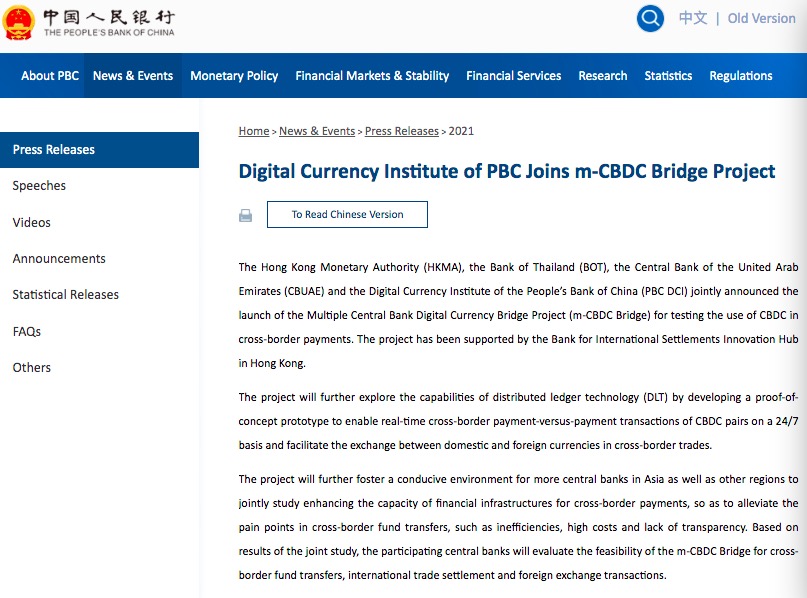
A sign of acceptance of e-CNY, the digital currency issued by China's central bank, at the checkout of a bookstore in Beijing, China, February 16, 2021. /Getty
A sign of acceptance of e-CNY, the digital currency issued by China's central bank, at the checkout of a bookstore in Beijing, China, February 16, 2021. /Getty
Editor's note: Matteo Giovannini is a finance professional at the Industrial and Commercial Bank of China in Beijing and a member of the China Task Force at the Italian Ministry of Economic Development. The article reflects the author's views, and not necessarily those of CGTN.
China's relentless effort to elevate its role and prestige in global finance is proceeding through continuous technological advancements towards a not-so-distant future where all transactions are going to be conducted in a totally digitalized form, and has marked another decisive milestone this week.
As reported by several business media outlets the People's Bank of China (PBOC) has joined this week central banks from Thailand, United Arab Emirates (UAE) and Hong Kong in a project nicknamed m-CBDC Bridge that is aimed at developing a distributed ledger technology for real time cross-border transactions involving domestic and foreign currencies.
The initiative is no surprising since China and the UAE have simply expanded an initiative started last year under the name of Project Inthanon-LionRock by the Hong Kong Monetary Authority (HKMA) and the Bank of Thailand (BOT) whose goal was to utilize central bank digital currencies (CBDC) in order to circumvent the banking network and allow direct payments among banks.
In my view, this move represents a major breakthrough in the development and implementation of China's virtual currency since, for the first time, it shows an attempt to test the digital yuan outside of the country's borders giving a significant acceleration to a development process that has lasted for over five years.
In this sense, the decision to join the m-CBDC Bridge project can be read as a demonstration of strength and confidence that China wants to showcase to the rest of the world after the successful launch of domestic pilot tests in the cities of Shenzhen, Suzhou, Chengdu, Xiong'an New Area and, above all, Beijing during the last Spring Festival holiday.
Moreover, the strong support by the Bank for International Settlements Innovation Hub Center in Hong Kong guarantees the official mark of validation of the oldest global financial institution, whose mission is to foster stability and cooperation among central banks, while endorsing the start of the second phase of Project Inthanon-LionRock.
From a strategic perspective, China is demonstrating it can be in the leading position in terms of development of a sovereign digital currency with at least five years of advantage over large economies such as the United States and the European Union and to have a clear long-term strategic goal of making the renminbi a truly international legal tender.
In this respect, the decision to join the m-CBDC Bridge project directly shows China's commitment for an increased role in global finance as demonstrated by the recent announcement of a joint venture between SWIFT and PBOC's China National Clearing Center, a deal aimed at further opening up China's domestic financial market to the rest of the world and at promoting the yuan as a key global currency.
The m-CBDC Bridge project has the potential to become a landmark in the development of a safe financial infrastructure for cross-border transactions through distributed ledger technology (DLT) in a free, real-time, 24/7 ecosystem across several different jurisdictions and potentially attracting the interest of more and more central banks on a pan-Asia basis and in the rest of the world.

Digital Currency Institute of the People's Bank of China joins m-CBDC Bridge Project. /Screenshot via the website of the People's Bank of China
Digital Currency Institute of the People's Bank of China joins m-CBDC Bridge Project. /Screenshot via the website of the People's Bank of China
One aspect that deserves attention is that the other two countries on-board, Thailand and the UAE, are both part of the Belt and Road Initiative (BRI) and are already conducting trade in renminbi, and this aspect clearly facilitates the smooth transition and the acceptance of the digital version of the Chinese currency in future transactions with the world's second largest economy.
In this regard, I expect that other countries belonging to the BRI, especially in Southeast and Central Asia and Middle East, will soon consider the advantages of cross-border, real-time, multi-currency payments through a distributed ledger since they cannot deny the merit in terms of removing the costly pain points such as clearing and settlement and the possibility to leapfrog the decades-long intermediation of commercial banks.
Lastly, I strongly believe that the role of Hong Kong is going to be further elevated with the development and distribution of CBDC by becoming a well-regarded international transfer center. This outcome will be highly achievable not only because Hong Kong is one of the originators of the m-CBDC Bridge project but also considering its geographical location as a gateway to Chinese mainland, its reputation as one of the most attractive financial centers globally, its vast pool of capital and talents available and its status as one of the world's best fintech hubs.
All in all, China is showing to the rest of the world that it has a clear road map in the technological advancement of digital currency starting from a retail DCEP at domestic level and marching now towards an interoperability at international level.
Central bankers, politicians and other stakeholders in the West, who have for decades benefited from a dominant role in terms of major financial innovations, should be aware by now that the future of global banking comes from the East and that China is on its way to set the future global rules for international transactions in domestic virtual currencies.
(If you want to contribute and have specific expertise, please contact us at opinions@cgtn.com.)

